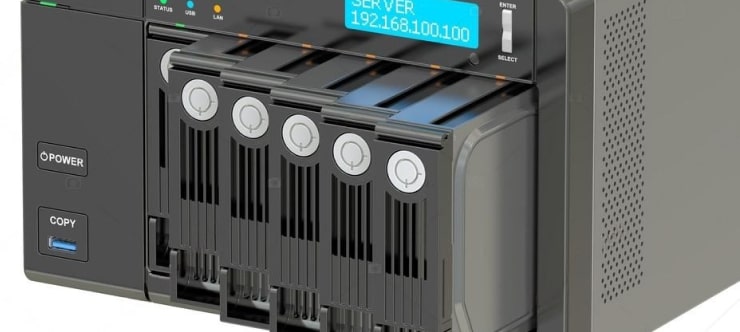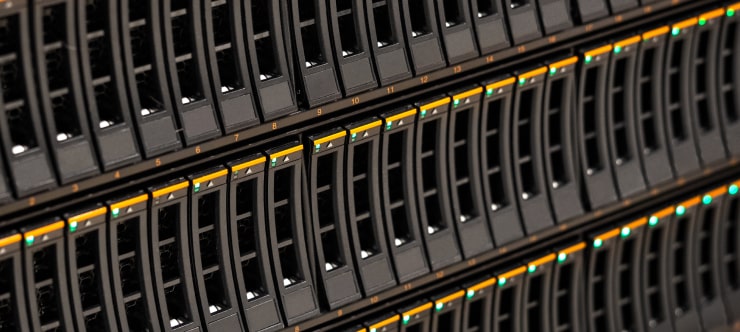What is a Virtual Data Center

I think there's an issue with my storage device, but I'm not sure
Start a free evaluationA Virtual Data Center (also known as a software-defined data center) is an infrastructure resource pool designed specifically for enterprise business needs. It provides computing, memory, storage, and bandwidth capabilities in the public or private cloud which eliminates the need to set up and run an on-premise data center.With its software-based approach, virtual data centers offer the same features as physical data centers but with more flexibility and scalability than traditional options.Virtual Data Centers are an ideal way for businesses to reduce IT costs, increase agility, and improve performance within their organization. By using a virtual data center, companies can be assured that their resources will be available whenever they need them and that they won’t have to worry about managing physical infrastructure in-house.Additionally, virtual data centers offer the option of scalability so businesses can easily adjust the level of computing power they need according to the changing needs of their business. Ultimately, virtualization is a great solution for companies who want to save on costs while still being able to access enterprise-level resources with ease.
How does a virtual data center work?
A virtual data center is a cloud-based resource pool. It contains computing (CPU), memory (RAM), storage (disk space), and bandwidth capabilities that are available for businesses to use when needed.Unlike an on-premise data center, this software-defined solution does not require any physical infrastructure or hardware installation. Instead, it is hosted in the public or private cloud and can be accessed from anywhere with internet access.A virtual data center allows companies to easily scale up their resources as needed without having to commit to any long-term contracts or investments in hardware. Additionally, it offers advanced management tools so businesses can monitor and control their usage more effectively than ever before.
Different types of cloud deployments
- Public cloud: These are good for money saving, however, the data security is not the best. On a public cloud, users share resources with other users.
- Private cloud: These can cost more, but they also add up more security for your business data. On a private cloud, cloud resources are for use by one business or organization. In this model, the cloud can be based on a third-party server, the vendor's server.
- Hybrid: The hybrid cloud mixes private and public clouds. Even though it’s still shared with other users, it has increased security.
Who should use a virtual data center?
A virtual data center is a great choice for businesses of any size that need enterprise-level performance and reliability.It can be used by companies who need to save on hardware costs while still having access to cutting-edge technology. As well as by those who are looking to increase agility and scalability in their infrastructure.Additionally, virtual data centers offer advanced management tools that allow users to monitor usage and control resources more efficiently than other solutions.Overall, virtual data centers provide a powerful solution for businesses looking for an affordable way to leverage the cloud without having to compromise on features or performance.
7 benefits of a virtual data center
A virtual data center offers many benefits to businesses of all sizes. Since it can host resources in the public cloud, it eliminates the need for an on-premise data center. This also makes it easier for companies to access enterprise-level technology without having to invest heavily in hardware or long-term contracts.Additionally, a virtual data center provides scalability so businesses can adjust their usage according to changing demands. It also allows them to monitor and control their usage more effectively than other solutions, helping them save money and maximize performance.
- Eliminates the need for an on-premise data center
- Access to enterprise-level technology without significant investments in hardware or long-term contracts
- Scalability to adjust usage according to changing demands
- Improved monitoring and control of resources compared to other solutions
- Reduction in IT costs with increased agility and performance
- Flexible scalability and managed services options
- Easy access from anywhere with an internet connection
Drawbacks of using a virtual data center
Although there are many advantages to using a virtual data center, it is important to understand that there are some potential drawbacks as well.
- Performance and latency issues due to the cloud environment
- Security concerns related to hosting data in the public cloud
- Potential vendor lock-in when using certain providers
Virtual data center and data security
Data security is a major concern for any organization, especially when dealing with sensitive customer information or financial data.Fortunately, virtual data centers offer several layers of protection to help protect against cyber threats.

For instance, they provide secure authentication tools and encryption technology to ensure that only authorized users can access the system. Additionally, they can monitor usage data to detect any suspicious activity and alert administrators in real-time. Finally, most providers also offer managed services which include added security measures such as regular backups and malware scanning.
- Secure authentication tools and encryption protocols
- Usage monitoring to detect suspicious activity
- Managed services including regular backups and malware scanning
- Physical machine isolation for enhanced privacy
- Firewalls and intrusion detection systems
Virtual data center vs physical data center
Physical Data Center
Cost
It needs a controlled air room, hardware, and a cooling system. The maintenance cost is also high with electricity and updating hardware.
Security
Security measures include the physical security of the hardware. Data center security must think about cyber threats as well as natural disasters.
Staff requirement
It requires several experts to install, maintain, and monitor the data center.
Scalability
Static and Predictable
Backups
The backups are manual and need a person from the IT team to perform them.
Disaster Recovery
Per-application basis
Virtual Data Center
Cost
There’s no initial investment. And it uses a pay-as-you-use model.
Security
Vendors provide security levels. But your IT team can add more security layers and train employees on cybersecurity best practices.
Staff requirement
Low staff requirement. However, it must be highly trained.
Scalability
Dynamic and Fast
Backups
Agentless backups are enabled by the hypervisor.
Disaster recovery
Center-wide strategies
Virtual data center recovery service
Even though virtual data centers have several benefits, including security, it’s not perfect yet. And you must provide methods to prevent cyber attacks.However, if an incident happens and you need help restoring your virtual data center data, SalvageData experts have the experience to recover it.Contact our data recovery technicians 24/7 for emergency virtual data center recovery service.Important: Keep regular backups to prevent the loss of any critical or sensitive data.
Summary
A Virtual Data Center is an infrastructure resource pool that provides computing, memory, storage, and bandwidth capabilities in the public or private cloud. It offers many benefits to companies of all sizes, such as eliminating the need for an on-premise data center while granting access to enterprise-level technology without significant investments in hardware or long-term contracts. Virtual Datacenters also come with some potential drawbacks, such as the difficulty of managing them and increased latency compared to on-premise deployments.
Related services
These are the most commonly requested data recovery services. At our headquarters' cleanroom lab, our certified engineers conduct a thorough review of any type of physical storage device, determining if there is logical or physical damage and carefully restoring all of the lost files.ces.

External Drive Data Recovery
We recover data from both external SSD and HDD drives. Rely on certified experts to restore your important files from damaged or corrupted external drives.

Hard Drive Data Recovery
Recover data from all brands of HDD, PC hard drives, and hybrid disks. Our specialists ensure fast and secure recovery for any data loss scenario.

NAS Data Recovery
Recover data from NAS devices, including RAID configurations. Our team handles all types of NAS systems and ensures data recovery with minimal downtime.

RAID Data Recovery
Our RAID data recovery services cover RAID 0, 1, 5, 10, and other configurations. We offer expert solutions for failed, degraded, or corrupted RAID arrays.

SAN Data Recovery
Our team specializes in handling SAN devices from leading manufacturers like Dell EMC, HP, and IBM, ensuring efficient recovery with minimal disruption to your operations.

SD Card Data Recovery
Our recovery experts specialize in restoring data from SD and memory cards. We guarantee quick recovery with a no-data, no-charge policy.

SSD Data Recovery
Our data recovery experts handle all SSD data loss scenarios with advanced tools, ensuring maximum recovery with high-security protocols.

USB Flash Drive Data Recovery
Recover lost data from USB flash drives, regardless of the damage or brand. We offer free in-lab evaluations to assess data recovery needs.
If you’re unsure about which data recovery service to choose, let our team assist you in selecting the appropriate solutions. We understand the anxiety that comes with a sudden drive failure, and we are more prompt in our actions compared to other recovery service providers.



